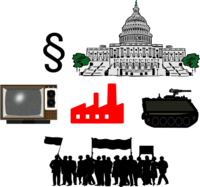Political factors affecting business
From CEOpedia | Management online
| Political factors affecting business |
|---|
| See also |
Political factors affecting business are closely tied to legal factors affecting business. Stable political environment creates confidence of citizens and companies investing or planning to invest in particular country. So they have very strong influence on economy and development of business. Political decisions have also strong influence on social and cultural environment in a country. Decisions of politicians may also affect pace (promote or disturb) of new technology adoption within economy.
Political factors involving central government organization
- level of bureaucracy (procedures, permits, etc.),
- level of corruption (tradition of bribing government officials)
- government stability and probability of changes of political systems,
- form of government: totalitarianism/autocracy/democracy or other type of political system.
- cyclical nature of democratic countries (elections can change politics from time to time)
- power structure,
- regional government powers,
- private or government owned companies dominate on the market,
- presence of state monopolies,
- government interfere (or not) with business,
- existence of pressure groups influencing government (farmers, miners, etc.),
- activities of lobbyists,
- safety and security, public protection, military,
- level of government spending,
Political factors involving freedom of citizens
- freedom of the press, radio and television,
- free elections,
- Internet censorship,
- freedom of association, freedom to protest,
- freedom of public assembly
- accountability of government and transparency,
- access to information about government actions,
- social unrest (rioting, looting),
- index of political and economic freedom within country,
- influence of media and public opinion on policy and decision making,
Political factors included in various legal regulations
- role of a constitution or similar national legal document,
- education regulation,
- regulation vs deregulation preferences,
- social and environmental policy, reforms and pressures to change,
- more at: legal factors affecting business
Political factors connected to international relations
- trade control (tariffs policy, regulation)
- involvement in international trade unions and agreements (trade blocks, EU, WTO, NAFTA, etc.),
- import/export restrictions on quality and quantity of product
- diplomatic activities promoting investment possibilities (good business climate) abroad,
- tax-free zones for newly created international businesses
- involvement in military conflicts thorough the world and regional,
- exchange rate manipulations through political decisions,
- possibility of expropriation (government taking over assets of foreign business due to no constitutional protection of ownership law),
Check also other:
- Social and cultural factors affecting business
- Technological factors affecting business
- Economic factors affecting business
- Ecological factors affecting business
- Legal factors affecting business
- Ethical factors affecting business
References
- Durnev, A., & Kim, E. (2005). To steal or not to steal: Firm attributes, legal environment, and valuation. The Journal of Finance, 60(3), 1461-1493.
- Edelman, L. B., & Suchman, M. C. (1997). The legal environments of organizations. Annual review of sociology, 479-515.
- Hail, L., Leuz, C., & Wysocki, P. (2010). Global accounting convergence and the potential adoption of IFRS by the US (Part II): Political factors and future scenarios for US accounting standards. Accounting Horizons, 24(4), 567-588.
- Pearce, J. A., Robinson, R. B., & Subramanian, R. (2000). Strategic management: Formulation, implementation, and control. Columbus, OH: Irwin/McGraw-Hill.
Author: Krzysztof Wozniak
